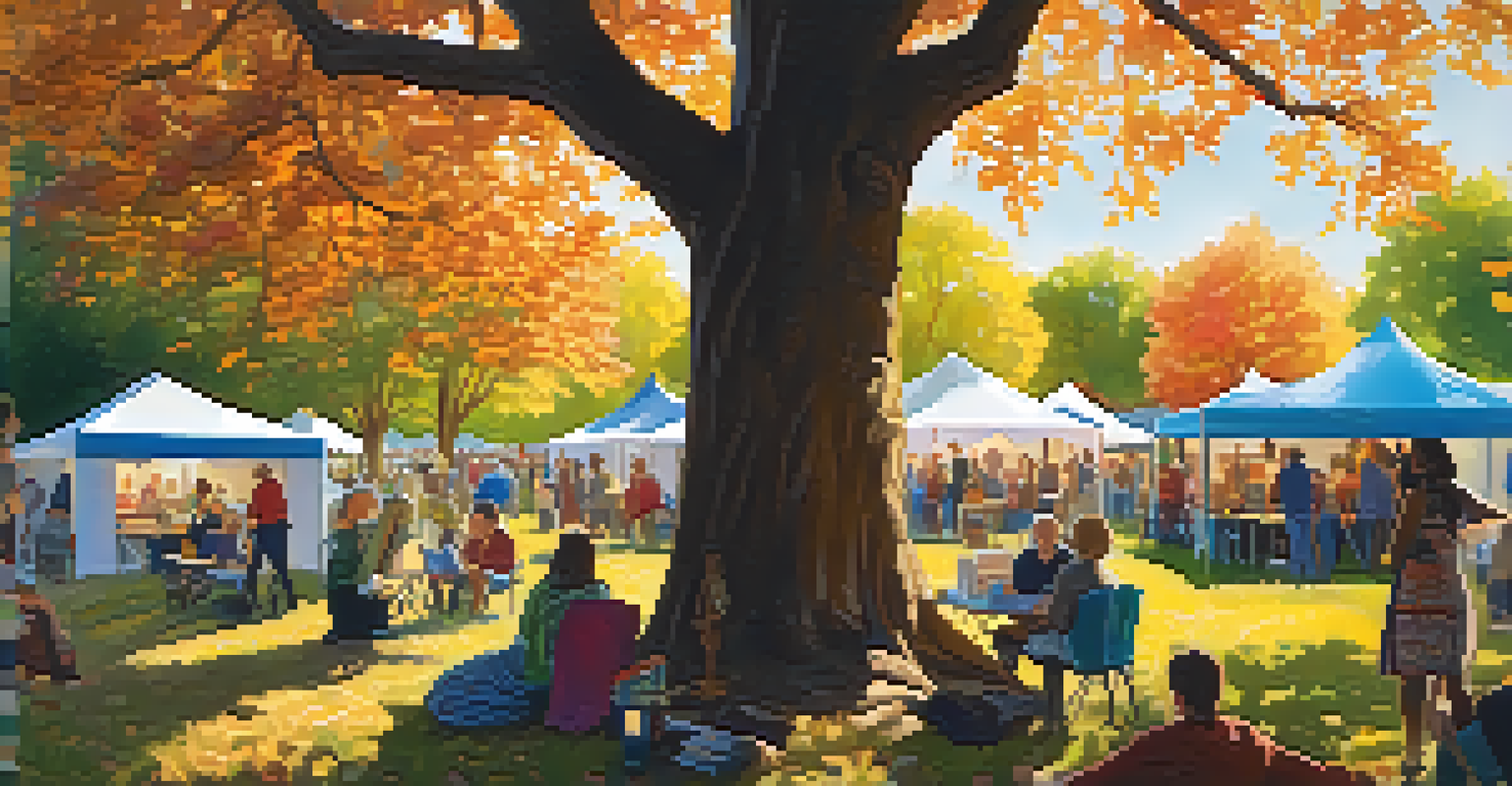Celebrating Missouri's Contributions to American Literature

Mark Twain: The Father of American Literature
Mark Twain, born Samuel Clemens in Florida, Missouri, is often referred to as the father of American literature. His works, particularly 'The Adventures of Tom Sawyer' and 'Adventures of Huckleberry Finn,' capture the spirit of 19th-century America. Through his vivid storytelling and unique characters, Twain addressed serious social issues like race and identity, making his work both entertaining and thought-provoking.
The secret of getting ahead is getting started.
Twain's use of regional dialects and humor provided a platform for exploring the complexities of American life. His adventures along the Mississippi River are not just tales of boyhood; they reflect the broader American experience, including the struggles with morality and freedom. This ability to weave personal and societal narratives is part of why Twain remains influential today.
Beyond his novels, Twain's essays and speeches further cemented his role as a critical voice in American literature. He often used satire to critique societal norms, making his points resonate with readers of all ages. His legacy continues to inspire writers and readers worldwide, showcasing the power of storytelling from Missouri.
T.S. Eliot: A Modernist Pioneer
Born in St. Louis, T.S. Eliot is another literary giant whose contributions revolutionized poetry. His seminal works, such as 'The Waste Land' and 'The Love Song of J. Alfred Prufrock,' reflect the complexities of modern life and the disillusionment following World War I. Eliot's intricate use of imagery and innovative structure challenged traditional poetic forms and opened doors for future generations.

Eliot's exploration of themes like alienation and cultural fragmentation resonated deeply with readers. He incorporated diverse influences, from classical literature to contemporary philosophy, creating a rich tapestry of meaning in his poetry. This blend of styles and ideas made his work a cornerstone of modernist literature.
Missouri's Literary Giants
Mark Twain, T.S. Eliot, and Langston Hughes are among the influential authors from Missouri who shaped American literature with their unique voices and styles.
In addition to poetry, Eliot's essays and plays further showcased his literary prowess. His role as an editor and critic also helped shape the literary landscape, promoting other writers and movements. By elevating the art of poetry, Eliot left an indelible mark on American literature, all while rooted in his Missouri upbringing.
Laura Ingalls Wilder: The Voice of Pioneer Life
Laura Ingalls Wilder, born in a log cabin in Pepin County, Wisconsin, spent much of her life in Missouri, where she drew inspiration for her beloved 'Little House' series. These autobiographical books not only entertain but also provide a window into the challenges and triumphs of pioneer life in America. Through her detailed storytelling, Wilder painted a vivid picture of resilience and the American spirit.
The only way to make sense out of change is to plunge into it, move with it, and join the dance.
Wilder's works highlight themes of family, hardship, and the importance of home, resonating with readers across generations. Her ability to weave personal experiences into broader historical contexts has made her stories timeless. They serve as a reminder of the struggles faced by earlier Americans and the values that shaped the nation.
The Little House series has inspired countless adaptations, from television shows to stage productions, solidifying Wilder's place in American literature. Her stories encourage readers to appreciate the simple joys of life while acknowledging the trials that come with it. Wilder's legacy continues to influence writers and readers alike, celebrating the richness of Missouri's literary contributions.
Langston Hughes: A Voice for the Harlem Renaissance
While often associated with Harlem, Langston Hughes was born in Joplin, Missouri, and his early experiences in the Midwest greatly influenced his work. As a leading figure of the Harlem Renaissance, Hughes used his poetry and prose to express the African American experience and advocate for social justice. His powerful words gave voice to the struggles and aspirations of his community during a time of great change.
Hughes's work often celebrated black culture and heritage, blending jazz rhythms with poetic forms to create a unique style. His famous poem 'The Negro Speaks of Rivers' reflects deep connections to the past and the enduring strength of his people. Through such sentiments, Hughes crafted a narrative that resonated with readers far beyond his time.
Celebrating Literary Festivals
Missouri's literary festivals foster community engagement and showcase local talent, helping to inspire new generations of writers and readers.
In addition to poetry, Hughes wrote essays, plays, and novels that explored themes of identity and race. His contributions have had a lasting impact on American literature, making him an essential figure in understanding the cultural landscape of the 20th century. Hughes's roots in Missouri remind us of the diverse influences that shape our literary heritage.
Shelby Foote: The Chronicler of the Civil War
Shelby Foote, a native of Greenville, Mississippi, spent significant time in Missouri, where he developed a passion for writing historical narratives. His monumental work, 'The Civil War: A Narrative,' is a three-volume series that provides a comprehensive view of the American Civil War. Foote's engaging storytelling and meticulous research transformed the way history is presented in literature.
Foote's approach intertwines personal accounts with broader historical events, allowing readers to connect emotionally with the past. His narrative style brings historical figures to life, making the complexities of the Civil War accessible and compelling. This blend of storytelling and scholarship has earned him a revered place in both literary and historical circles.
Beyond his books, Foote's appearances in Ken Burns' documentary series on the Civil War introduced his work to new audiences. His contributions highlight the importance of understanding history through a literary lens, and his ties to Missouri remind us of the region's rich historical context. Foote's legacy continues to inspire writers and historians alike, emphasizing the power of words in shaping our understanding of the past.
William S. Burroughs: The Avant-Garde Innovator
William S. Burroughs, born in St. Louis, Missouri, is known for his groundbreaking contributions to the Beat Generation and postmodern literature. His novel 'Naked Lunch' is a prime example of his experimental style, challenging conventional narrative forms and exploring themes of addiction and societal norms. Burroughs's work pushes boundaries, inviting readers to confront uncomfortable truths.
Burroughs's unique writing style, which often incorporates cut-up techniques, reflects the chaotic nature of modern life. His ability to blend autobiography with fiction creates a surreal experience for readers, prompting them to question reality and perception. This avant-garde approach has influenced countless writers and artists, expanding the possibilities of what literature can be.
Preserving Literary Heritage
Efforts by organizations and institutions in Missouri ensure that the literary contributions of local authors are celebrated and preserved for future generations.
In addition to his novels, Burroughs's essays and lectures contributed to discussions about art, culture, and politics. His influence extends beyond literature, impacting music, visual arts, and countercultural movements. Burroughs's legacy as a Missouri-born innovator demonstrates the diverse voices that have shaped American literature.
The Impact of Missouri's Literary Festivals
Missouri is home to several literary festivals that celebrate and promote its rich literary heritage. Events like the Kansas City Public Library's 'Read Across America' and the St. Louis Literary Festival bring together authors, readers, and enthusiasts to share their love for literature. These gatherings not only highlight local talent but also foster a sense of community among writers and readers.
Such festivals provide a platform for emerging authors to showcase their work, offering workshops and discussions that cultivate new voices in literature. By encouraging dialogue about various literary genres and themes, they contribute to the ongoing evolution of Missouri's literary landscape. Participants leave inspired, with a deeper appreciation for the craft of writing.

Moreover, these festivals often feature prominent authors, allowing attendees to engage directly with influential figures in literature. This connection can spark interest in reading and writing, encouraging new generations to explore their literary passions. Missouri’s literary festivals play a crucial role in celebrating and preserving the state’s contributions to the broader tapestry of American literature.
Preserving Missouri's Literary Legacy
As we celebrate Missouri's contributions to American literature, it's essential to recognize the efforts to preserve this rich literary heritage. Organizations like the Missouri Humanities Council and various libraries work tirelessly to promote and protect the works of local authors. They ensure that the stories and voices that emerged from Missouri are not forgotten and continue to inspire future generations.
Additionally, literary archives and museums dedicated to local authors help educate the public about their significance. These institutions offer resources for researchers and enthusiasts, creating a deeper understanding of how Missouri has shaped the American literary landscape. Such preservation efforts highlight the importance of storytelling in connecting communities and fostering cultural appreciation.
By honoring Missouri's literary legacy, we not only celebrate the past but also encourage ongoing creativity and expression. As new writers emerge and existing stories are revisited, the literary landscape continues to evolve, ensuring that the voices from Missouri remain vibrant. Preserving this legacy is a collective responsibility, one that enriches our cultural heritage and inspires future storytellers.